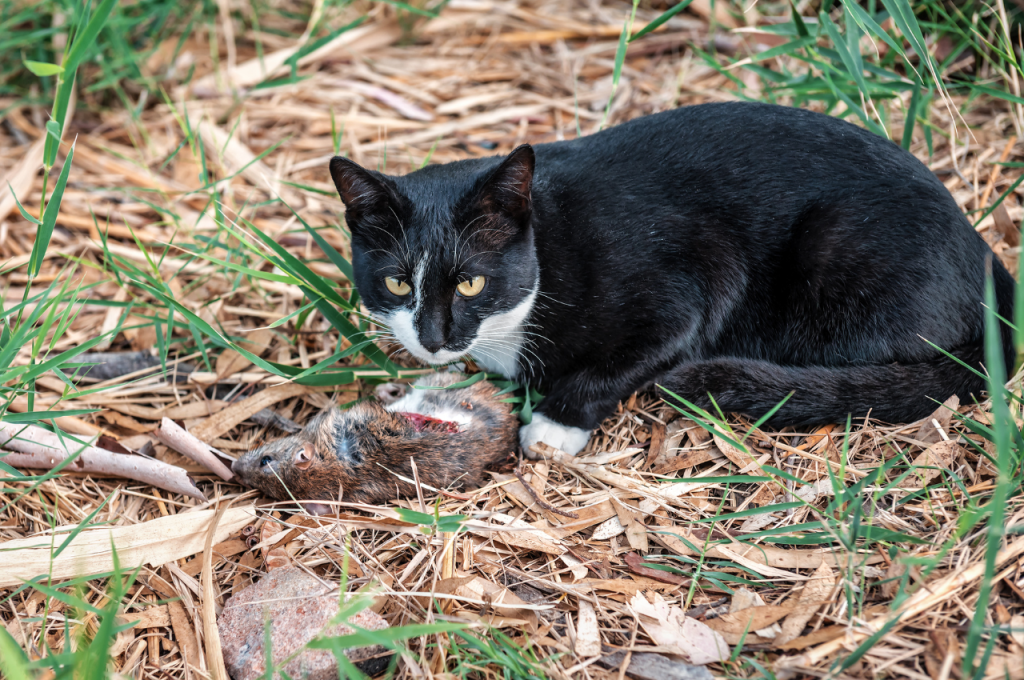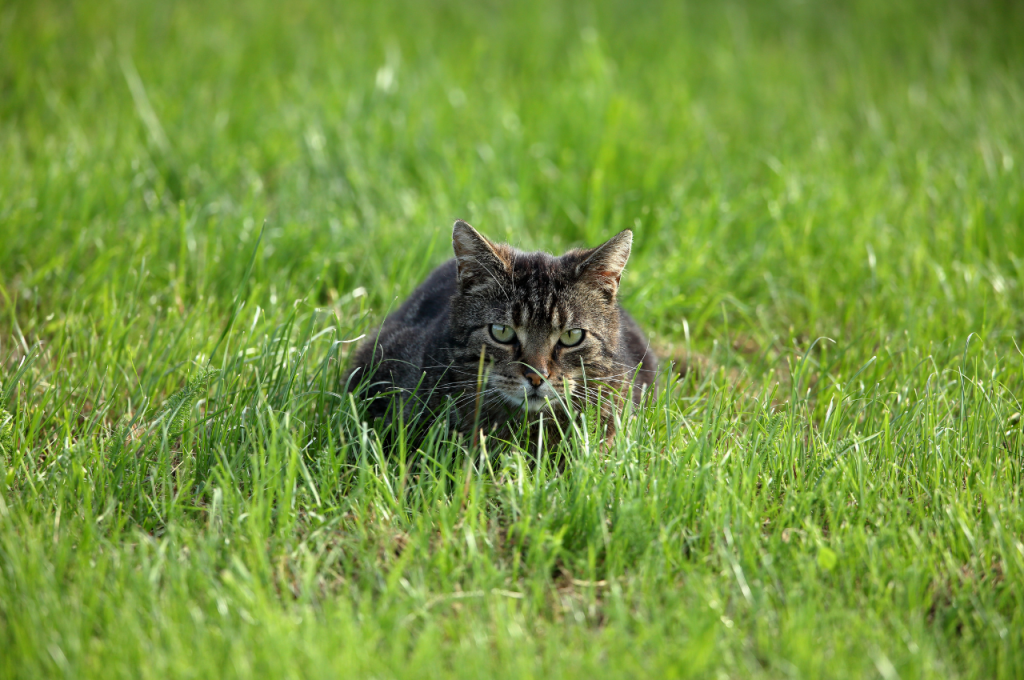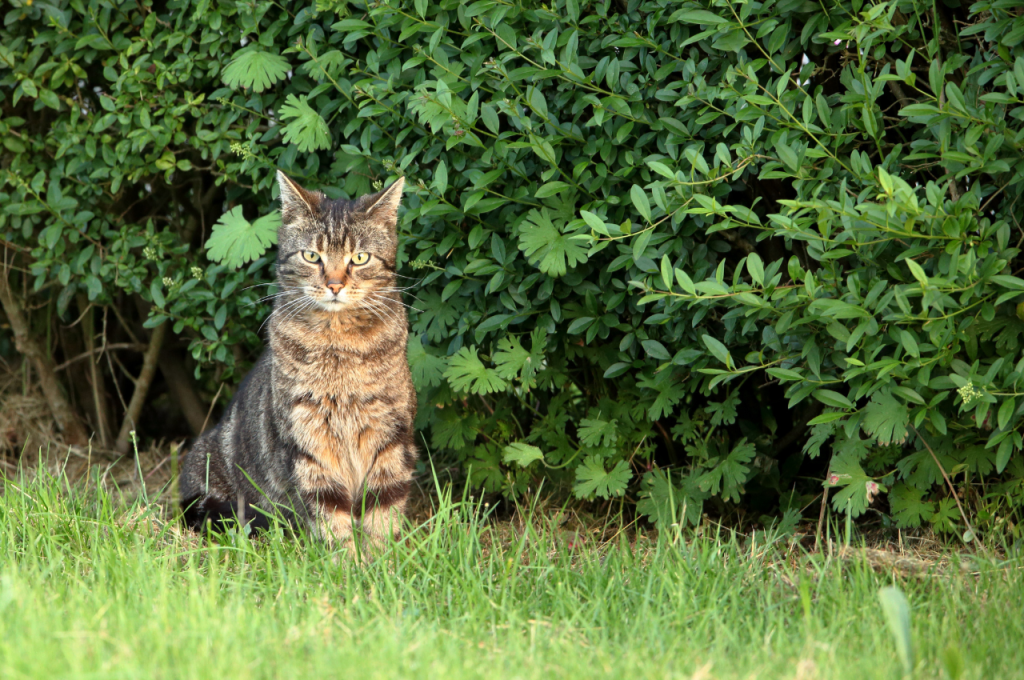Yes, it is normal for a cat to eat a mouse. Cats are natural hunters and carnivores, so consuming small prey like mice is instinctual and part of their natural behavior.
This behavior is rooted in their predatory instincts and has been observed in domestic and wild cats alike. It’s important for cat owners to understand that this behavior is a normal aspect of their pet’s natural instincts. However, it’s crucial to ensure that the mouse hasn’t been exposed to any harmful substances, as this can pose health risks to the cat. Regular deworming and parasite prevention are important to safeguard the cat’s health if they consume mice. Understanding and acknowledging this behavior can help owners provide the best care for their feline companions.
Feline Predatory Behavior
Is it normal for a cat to eat a mouse? Yes, it is. Feline predatory behavior stems from their instinct to hunt, even if they are well-fed. Eating mice can provide essential nutrients and mental stimulation. However, wild mice may carry parasites or diseases, so it’s important to monitor your cat’s health and ensure regular veterinary check-ups. Providing safe toys that mimic prey can also help satisfy their hunting instincts in a controlled environment, promoting both their physical and mental well-being.

Natural Instincts
Cats are natural hunters, instinctively driven to hunt and capture prey. Is it normal for a cat to eat a mouse? Yes, this behavior is part of their natural instincts.
Historical Context
In the past, cats played a crucial role in controlling rodent populations. It’s part of their natural hunting behavior and historically vital in keeping homes and farms rodent-free.
Health Risks in Eating Mice
Cats are natural hunters, and it is not uncommon for them to catch and consume mice. While this behavior may seem instinctual, there are health risks associated with a cat consuming a mouse. Understanding these risks can help pet owners take the necessary precautions to protect their feline companions.
Parasites and Diseases
When a cat eats a mouse, it can be exposed to a variety of parasites and diseases that the mouse may carry. Mice can harbor parasites such as tapeworms, roundworms, and fleas, which can be transmitted to the cat through consumption. Additionally, mice can carry diseases such as leptospirosis, hantavirus, and lymphocytic choriomeningitis, posing a risk to the cat’s health.
Preventing Health Issues
To prevent potential health issues associated with a cat consuming mice, pet owners can take several proactive measures. Regularly deworming the cat and treating it for fleas can help mitigate the risk of parasite transmission. Additionally, keeping the cat indoors and minimizing its exposure to mice can reduce the likelihood of disease transmission.
Nutritional Aspects of Mice
Mice are a good source of nutrition for cats, as they contain a high amount of protein and fat. It is normal for cats to eat mice, as it is a natural behavior that allows them to fulfill their nutritional needs. However, it is important to monitor your cat’s hunting behavior to prevent them from consuming mice that may carry diseases or parasites.
Protein and Fat Content
Mice are rich in protein and fat, providing essential nutrients for cats.
Compared with Commercial Cat Food
Mice offer a natural source of nutrition, with higher protein and fat content compared to commercial cat food. Mice contain around 55-60% protein, ideal for a cat’s diet. Fat content in mice is around 20-30%, beneficial for energy and overall health. In comparison, commercial cat food typically contains 25-35% protein and 10-20% fat. Mice offer a well-rounded nutritional profile for cats, mimicking their natural diet.
Psychological Impacts on Cats
Cats eating mice is a normal behavior rooted in their instinct as predators. However, it can have psychological impacts on cats, such as increased aggression or territorial behavior. Understanding these impacts can help cat owners address any related issues effectively.
Hunting Satisfaction
Cats have a natural instinct to hunt, and when they catch a mouse, it can provide them with a sense of satisfaction. The act of hunting triggers their predatory behavior and allows them to showcase their hunting skills. It gives them a sense of accomplishment and fulfillment, similar to how humans might feel after completing a task or achieving a goal. Mice are small and quick, making them challenging prey for cats. When a cat successfully catches a mouse, it can boost their self-confidence and enhance their overall well-being. This hunting satisfaction can have positive psychological impacts on cats, as it allows them to engage in their natural instincts and fulfill their primal desires.
Mental Stimulation
In addition to hunting satisfaction, the act of chasing and catching a mouse provides cats with mental stimulation. Cats are intelligent creatures that require mental exercise to stay mentally sharp and prevent boredom. Hunting mice requires strategic thinking, problem-solving skills, and quick reflexes, all of which contribute to mental stimulation.
When a cat is engaged in hunting, it activates different parts of their brain and keeps them mentally active. This mental stimulation is crucial for their overall cognitive development and can help prevent behavioral issues that may arise from boredom or lack of mental stimulation. The process of stalking, pouncing, and capturing a mouse provides cats with a mental challenge that keeps their minds sharp and focused. It allows them to use their senses, such as sight, hearing, and smell, to track and locate their prey. This mental stimulation not only satisfies their natural instincts but also keeps them entertained and mentally engaged.
In conclusion, the act of a cat eating a mouse is normal and can have positive psychological impacts on them. The hunting satisfaction and mental stimulation that cats experience when catching a mouse contribute to their overall well-being and fulfillment. As responsible cat owners, it is essential to understand and support these natural instincts while ensuring the safety and health of our feline companions.
Signs of Excessive Hunting
Excessive hunting by a cat may exhibit signs such as bringing home multiple prey, increased aggression towards other animals, and a decreased appetite for commercial cat food. While it is normal for cats to eat mice, excessive hunting may indicate underlying issues that need attention.

Excessive hunting behavior in cats can be a cause for concern for pet owners. While it is natural for cats to hunt and catch prey, there are certain signs that may indicate your furry friend is taking it to the extreme. Being aware of these signs can help you determine if your cat’s hunting habits are within the normal range or if it’s time to consult a vet.
Behavioral Changes
When a cat becomes obsessed with hunting, there are several behavioral changes that may become apparent. These changes can include:
- Increased hunting frequency: If you notice that your cat is constantly on the prowl, chasing after anything that moves, it could be a sign of excessive hunting. Cats typically hunt for survival or play, but when the behavior becomes obsessive, it may indicate a problem.
- Bringing home more prey: While it’s not uncommon for cats to bring home the occasional catch, an excessive hunter may start bringing home multiple prey items on a regular basis. This could include mice, birds, or even insects.
- Loss of interest in other activities: Cats that are excessively hunting may start to lose interest in their usual playtime or interaction with their owners. They may become fixated on hunting and spend less time engaging in other activities.
- Weight loss or poor appetite: If your cat is expending a lot of energy on hunting and not consuming enough food to compensate, it may lead to weight loss or a decrease in appetite. This can be a sign that their hunting behavior has become excessive.
Managing a Cat’s Predatory Instincts
To manage a cat’s predatory instincts, it’s normal for a cat to eat a mouse as it’s a natural behavior. Providing interactive toys and engaging playtime can help satisfy these instincts and prevent the hunting of small animals. Encouraging mental stimulation through puzzle feeders can also redirect their hunting behavior.
Cats have a natural instinct to hunt, and it is not uncommon for them to catch and eat mice. While it may seem alarming to some pet owners, this behavior is normal for cats. However, as responsible cat owners, it is important to manage their predatory instincts to ensure their safety and the safety of other animals in the household. Here are some ways to manage a cat’s predatory instincts:
Safe Alternatives to Hunting
One way to manage a cat’s predatory instincts is to provide safe alternatives to hunting. Interactive toys, such as feather wands and laser pointers, can simulate prey and provide a healthy outlet for a cat’s hunting instinct. Puzzle feeders can also provide mental stimulation and simulate the challenge of catching prey.
Training and Enrichment
Training and enrichment can also help manage a cat’s predatory instincts. Teaching a cat basic commands, such as “leave it” and “come,” can prevent them from hunting and harming other animals. Enrichment activities, such as hiding treats around the house or providing climbing structures, can also provide mental and physical stimulation and prevent a cat from becoming bored and hunting out of boredom.
In conclusion, while it is normal for cats to eat mice, it is important for pet owners to manage their predatory instincts to ensure their safety and the safety of other animals in the household. Providing safe alternatives to hunting and implementing training and enrichment activities can help satisfy a cat’s natural hunting instinct and prevent them from engaging in harmful behavior.
Impact on Local Wildlife
It is normal for a cat to eat a mouse as it is a natural behavior. However, this can impact local wildlife, especially if the cat is an outdoor pet. Cats can disrupt the natural balance of the ecosystem by hunting and killing small animals, affecting the local wildlife population. Impact on Local Wildlife Cats are natural hunters and their predation on small animals, including mice, can have a significant impact on the local wildlife population.
Reducing Negative Effects
To minimize the negative effects of cats preying on mice and other small animals, it’s essential for pet owners to take measures to limit their cat’s hunting activities, such as using bells on collars to alert potential prey and keeping cats indoors during peak hunting times. Additionally, providing cats with enrichment and interactive play can help satisfy their hunting instincts without impacting local wildlife.
Promoting Biodiversity
Promoting biodiversity involves creating an environment where various species can thrive. By reducing the impact of cats on local wildlife, it’s possible to promote biodiversity. Encouraging natural habitats and providing safe spaces for small animals can help maintain a balanced ecosystem. It’s also essential for cat owners to consider the impact of their pets on local wildlife and take steps to minimize it. Overall, it’s important to be mindful of the potential impact of cats hunting mice and other small animals on local wildlife. Taking steps to reduce negative effects and promote biodiversity can help create a harmonious coexistence between domestic pets and the surrounding ecosystem.
Understanding Cat Behavior
Cats are natural hunters and their instinct to hunt and catch prey, such as mice, is deeply ingrained in their behavior. Understanding why your cat may eat a mouse can shed light on their natural instincts and behaviors.

Communicating with Your Cat
Cats communicate through body language, vocalizations, and behaviors. Pay attention to your cat’s body language and vocal cues to understand their needs and emotions. Engage in interactive play and provide positive reinforcement to build a strong bond with your feline friend.
Creating a Balanced Environment
Creating a balanced environment for your cat involves providing mental and physical stimulation, a nourishing diet, and a safe and comfortable living space. Offer a variety of toys, scratching posts, and perches to keep your cat mentally and physically engaged.
When to Consult a Vet
While some hunting behavior is normal for cats, it is important to monitor for signs of excessive hunting. If you notice any of the following symptoms, it may be time to consult a vet:
- Significant changes in weight: If your cat is losing weight rapidly or has a sudden decrease in appetite, it could be a sign that their hunting behavior is negatively impacting their health.
- Injury or illness: Excessive hunting can put cats at a higher risk of injury or exposure to diseases carried by their prey. If your cat is frequently bringing home injured or sick prey, it may be a cause for concern.
- Behavioral changes: If your cat’s hunting behavior has drastically changed and they are showing signs of aggression, anxiety, or other abnormal behaviors, it is best to consult a vet for further evaluation.
Remember, each cat is unique, and their hunting behavior can vary. However, if you notice any of the signs mentioned above and are concerned about your cat’s well-being, it is always better to seek professional advice. A vet can help determine if your cat’s hunting behavior is within a normal range or if further intervention is necessary to ensure their health and happiness.
Conclusion
It is completely normal for a cat to eat a mouse. This behavior is ingrained in their DNA and is a natural part of their hunting instincts. However, it is important to keep in mind that mice can carry diseases and parasites that can harm your cat.
It is also important to make sure your cat is up to date on their vaccinations and preventative care to protect their health. Overall, while it may be unsettling for us humans to witness, it is a normal and natural behavior for our feline friends.
